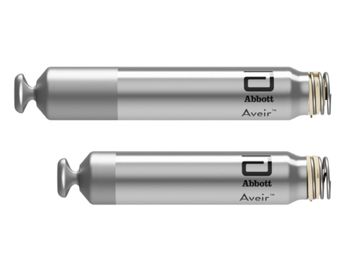Liverpool Heart and Chest Hospital successfully implants world’s first leadless dual chamber pacemaker
Thursday, 21 November 2024

The world's first dual chamber leadless pacing technology is being introduced in hospitals across the UK, with staff based at Liverpool Heart and Chest Hospital among the first to roll-out the groundbreaking technology to treat complex cases of abnormal or slow heart rhythms.
The components of the AVEIR™ dual chamber (DR) leadless pacemaker system, created by global healthcare company Abbott, are roughly one-tenth the size of a traditional pacemaker. They communicate with each other using exclusive implant-to-implant™ technology, to establish continuous, synchronised pacing between the two chambers of the heart that work together to pump blood through the body.
Arrhythmias or heart rhythm problems are experienced by more than 2 million people in the UK(3) and nearly 80% of people who receive a pacemaker need a dual chamber option to pace both chambers of the heart. (4)However, until now, available leadless pacing options have been limited to single chamber ventricular devices because seamless, wireless synchronisation of two leadless pacemakers has been a significant technological challenge.
38-year-old Rebecca Ronan from Liverpool, became one of the first patients in the region to benefit from the new technology which is designed to be implanted directly into the heart through a minimally invasive procedure, eliminating the need for cardiac leads. Rebecaa had complete heart block and needed to have heart valve replacement surgery which she wouldn’t have been able to have if it were not for the leadless features of the AVEIR pacemaker. Leadless pacemakers reduce patients’ exposure to potential lead and pocket-related complications, potentially offering a less restrictive and shorter recovery period post-implantation than traditional pacemaker implantation.
Rebecca said:
“Since being implanted with the AVEIR pacemaker, along with undergoing heart valve replacement surgery for my complete heart block, the difference in my quality of life has been instant.
“Before my procedures, simple activities such as going to the shops was almost impossible. Now, I am able to get on with my life looking after my son and getting back to the things I enjoy.”
The new AVEIR DR leadless pacemaker is also engineered to be easily retrieved should a person’s therapy needs change, or if a replacement device is required in the future. It uses far less battery current than other available devices due to a high-frequency pulse that relays messages via the naturally conductive characteristics of the body’s blood. The result is an innovative solution that enhances patient comfort.
Explaining the benefits for patients, Dr Reza Ashrafi, LHCH Consultant Cardiologist, said:
“This advance in pacing technology is good news for our patients here at LHCH. This new treatment option gives another way to treat slow or irregular heart rhythms compared to traditional pacemakers for selective patients.”
Ross Campbell, Abbott’s General Manager, Cardiac Rhythm Management for UK, Ireland and Germany, said:
“We’re pleased to see the first implants of Abbott’s AVEIR DR system taking place across the UK in hospitals like Liverpool Heart and Chest Hospital, which is taking advantage of the latest technologies in heart health to provide the best care for their patients. Our ambition at Abbott is to develop life-changing and breakthrough technologies that transform the lives of patients for the better – and this project is one we’ve worked hard on to engineer.
“Thanks to the brilliant medical staff at Liverpool Heart and Chest Hospital, patients in Liverpool now have a solution that is built for their future.”
For important safety information on the AVEIR DR leadless pacemaker system, click here.